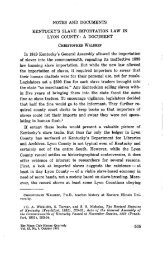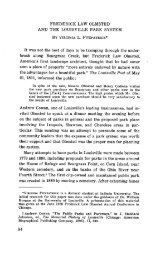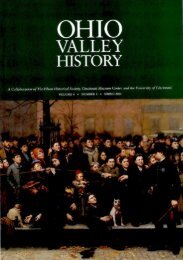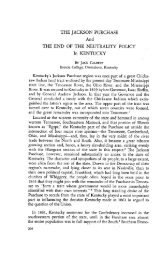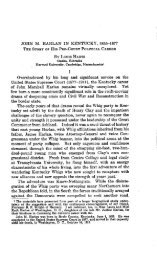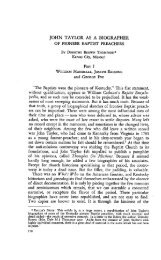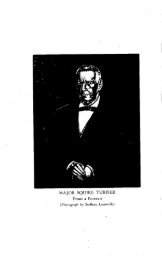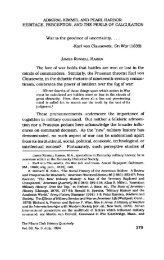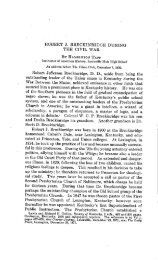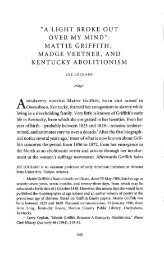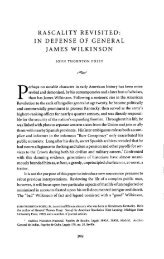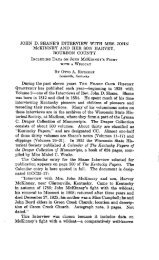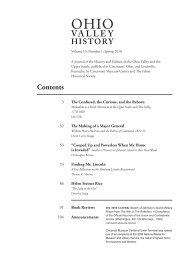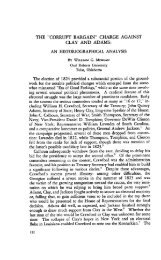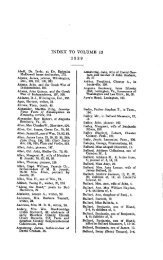CASSIUS M. CLAY, "LION" - The Filson Historical Society
CASSIUS M. CLAY, "LION" - The Filson Historical Society
CASSIUS M. CLAY, "LION" - The Filson Historical Society
You also want an ePaper? Increase the reach of your titles
YUMPU automatically turns print PDFs into web optimized ePapers that Google loves.
142 <strong>The</strong> <strong>Filson</strong> Club History Quarterly [Vol. 31<br />
Letters which Cassius Clay had written to the newspapers during<br />
this canvass and a personal attack upon the beloved leader of the<br />
Whig party which he had imprudently addressed to the New York<br />
Express did nothing to salve a coolness which had grown up between<br />
the elder statesman and his brash young kinsman. 1 In Kentucky, where<br />
Henry Clay was a popular idol, this and Cassius Clay's resolute refusal<br />
to compromise his anti-slavery principles52 destroyed any chance of his<br />
advancement within the old line Whig party. When delegates came<br />
to be elected to the Kentucky Constitutional Convention of 1850,<br />
Cassius Clay was not even among the list of candidates.<br />
<strong>The</strong> advocates of slavery, who were represented by powerful leaders<br />
in both the old parties, s were everywhere triumphant. When, in 1851,<br />
Cassius Clay ran as an anti-slavery candidate for Governor54 he received<br />
less than 5,000 votes.<br />
His fight in Kentucky against slavery had, however, made him<br />
known throughout the North and given him political stance as an<br />
Outspoken anti-slavery politician from south of the Mason and Dixon<br />
line. 55<br />
For him, the years leading up to the Civil War were to be years of<br />
persistent agitation by him of the slavery issue in his home State, in<br />
constant peril of his life and fore-armed against violence by a wellearned<br />
reputation for a proficiency in self-defense with a variety of<br />
weapons. Attention to his business affairs were to be interrupted by<br />
calls on the lecture circuit and on the political stump from outside of<br />
the State.<br />
For the venerable sage of Ashland, the few years remaining to him<br />
were to see him, while absent for the winter in New Orleans, elected<br />
again by the Kentucky legislature to the United States Senate---this<br />
time practically with unanimity--where he was to perform his last<br />
great service for the Union in exercising the masterly leadership which<br />
made possible the great Compromise of 1850. That Compromise, the<br />
last of the three great Compromises, which had saved the country<br />
from the threat of disunion and with which his name will be forever<br />
associated, proved even less durable than the two which had preceded<br />
it. It did, however, postpone the Civil War for a decade, thus insuring<br />
the ultimate triumph over disunion, by enabling the North far to<br />
outstrip the South in population and in industrialization.<br />
Editor's Note---It is hoped that additional unpublished letters of and about the<br />
"Lion" of White Hall will be edited by Mr. Clay for the History Quarterly at<br />
an early date.



